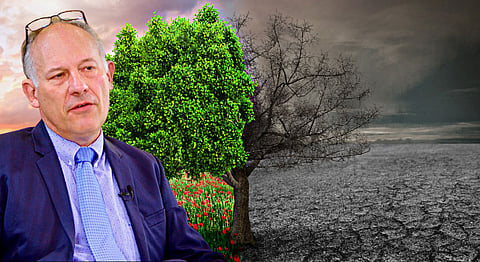“It’s not just carbon, it’s climate and behavioural change” – Kevin Whitfield on Nedbank CIB’s carbon journey
Nedbank Corporate and Investment Banking (Nedbank CIB) has been diligently working on ambitious and rigorous goals towards a just energy transition, as evidenced by the Nedbank carbon journey series published on BizNews.com over the past couple of months. In this interview, Bronwyn Nielsen speaks to Kevin Whitfield, head of Africa Treasury at Nedbank CIB, about the company's carbon journey, a venture initiated by former Nedbank CEO Tom Boardman "in the space of a couple of hours of decision-making". Whitfield, who excitedly shared details about the company's planned activities and projects, said, "The bottom line is we need to get a price for carbon and natural capital that allows sustainable and long-term change." – Nadya Swart
Kevin Whitfield on Nedbank's carbon journey
This has been a hugely, hugely exciting journey. It required bold and visionary leadership to get us to the point where we are today. What actually happened was: Tom [Boardman – former Nedbank CEO] decided that the bank would be carbon neutral and he did something quite unusual for a corporate. He went to the public space via engineering news and announced to the world that the bank would be going carbon neutral. He then very clearly articulated a string of measurements, a number of dates, put a team together and started our carbon journey in the space of a couple of hours of decision-making.
The big, big, big, big drawcard there was that it removed all forms of resistance to change or inertia inherent in the system. And that created our opportunity to commence. That was supported by a phone call from His Royal Highness, the Prince of Wales, to ask Tom what he was doing in the African rainforest space, and Tom wanted to present a meaningful business case.
On layman descriptions for the terms carbon neutral and carbon offsetting
Lots of people look at carbon offsetting and what they actually see is a large corporate with a big cheque book being able to cover their sins because of the size of their cheque book. That is not the Nedbank approach. Nedbank decided that to be carbon neutral meant we first needed to set our own targets. Those targets and those aspirations needed to be measured and reduced annually. We needed to publish those messages and share the outcomes transparently. From there, we would end up with a core carbon level of emissions and that core carbon level of emissions we would then like to offset.
Now, what offsetting means is we go and investigate and find projects that meet our requirements in terms of our organisational ethic, our mandate – which is Africa only – and they need to be socially and environmentally, economically and socio-economically changing. They shouldn't just be the easiest method of sourcing a credit to offset an activity.
On projects that meet Nedbank CIB's criteria
This is the real fun part. We've spent a lot of time travelling on the continent of Africa and we've identified a number of projects that give us the representation and the impact that we like. And those go from cooking stoves to forestry projects to water filtration and purification projects. Our most exciting projects are those in the forestry space, because of their size and scale. And a change in behaviour there means that you can change what has happened all over the globe, as forests have been deforested in favour of sustainable agriculture or access to firewood, etc.
On Nedbank CIB's planned activities in this space going forward
We're excited to say that as the carbon world is becoming first and foremost – and it's not just carbon, it's climate change, it's behavioural change. A number of the activities that we've invested in our foundations can now be leveraged. So, we are planning to continue to invest with our stakeholders, with our clients in a growing space to develop quality assets. We are a little bit concerned that there's a lot of good intentions followed by large investment cheques coming in, and those projects may not be as well-managed as they should be. That will just cause further credibility issues in the carbon, the climate space, to feed the cynics.
The bottom line is we need to get a price for carbon and natural capital that allows sustainable and long-term change. What we don't need is short-term sugar injections that cause temporal shifts only to support long-term disappointment. It's now time to get people to change and recognise and be rewarded for doing the right thing in the right place, starting with the most vulnerable.
Read Also:

